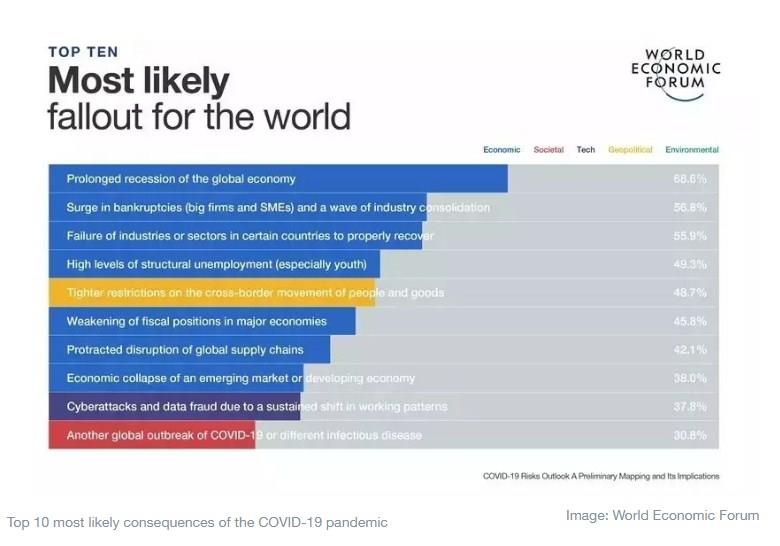by Puninda Thind, George Patrick Richard Benson, Daniela Pico, Dominique Souris, Ana Gonzalez Guerrero, Rita Steele and Alyssa McDonald*
The COVID-19 pandemic has upended and laid bare the inequities in our global economic and social systems. It has made clear that some of the most vulnerable populations and undervalued professions in our society are not only the hardest hit during times of crisis but also the ones we rely upon the most.
Across the globe, the pandemic has had a particularly severe impact on youth employment owing to disruptions to education, job layoffs and income losses and increased barriers to job market entry. For those young people who are still pursuing education, the pandemic is likely to result in unprecedented new inequalities upon graduation.
There are more young people in the world than ever before and they are critical members of the global society driving forward ideas, innovations and movements. Youth are also on the frontlines of other major economic transformations across the global economy, including digitalization, automation, climate action and others. We believe in the opportunity for a Great Reset – our society has the capacity to rise to this challenge. If we seize this, much as we did in the aftermath of World War II, we know a better, more equitable, compassionate, prosperous global economy is possible.
The numbers on youth employment are in
According to the COVID-19 Risks Outlook Report, 49.3% of senior risk experts believe high levels of structural unemployment, especially among youth, is one of the most likely consequences of the pandemic; 43.8% believe this to be an area of great global concern.

The recent ILO survey on youth unemployment also finds that youth around the world have been severely and disproportionately affected by the COVID-19 crisis, especially young women. More than one in six young people are out of work as a result of the pandemic. Meanwhile, 178 million youth are employed in sectors that have been hit hard by the pandemic and are facing layoffs and 131 million of these young people are informally employed.
The survey also finds that young women are “more likely to experience significant challenges in combining their job with an increased amount of unpaid care work.” Furthermore, for many young women who already face various forms of economic marginalization, there could be compounding challenges or disenfranchisement.
Skills-proofing for the future of work
Beyond the COVID-19 pandemic, we are facing one of the greatest workforce challenges of the 21st century: the skills gap for young workers in the global economy. Skills-proofing will be essential as the speed of change and disruptions continue to transform the future of work. Pragmatic and effective mechanisms will be required to create new opportunities that meet the evolving technological and economic contexts and demands.
As the latest Jobs of Tomorrow Report from the World Economic Forum notes, demand for digital and human factors will continue to rise, resulting in a greater demand for care economy and green economy jobs, in particular, among other clusters of professions. It is important to ensure that young people are equipped and empowered to combat long-standing challenges to our society, particularly the threat of climate change.
Call to action: prioritizing youth in economic recovery efforts
An urgent and comprehensive response to tackling youth unemployment during COVID-19 must be a crucial aspect of countries’ economic recovery strategies. It is a once-in-a-generation opportunity to reshape the foundations of our global economy, prepare youth to thrive in the future of work, generate new widespread prosperity and lay the groundwork for a safer, cleaner, greener and more equitable world. Investing in and re-skilling people now can help us get them back to work immediately while building more just, inclusive and resilient economies.
In light of this, Canadian Shapers have penned an open letter to the Government of Canada urging the government to expedite investments in youth training and upskilling as a crucial part of its COVID-19 recovery strategy. This Reskill4Recovery initiative, lays out the rationale for this investment and breaks it down into three recommendations:
-Invest in future-proofed and essential skills for youth entering the workforce and people whose work is in transition;
-Invest in sector-specific skills and technical training to address the most pressing problems facing our society, particularly climate change;
-Invest immediately in job-creation programmes.
As the COVID-19 pandemic will have lasting repercussions on youth, such actions at the state or national level can help bring forward inclusive youth voices. Young people are crucial to economic recovery efforts. Pushing our national institutions to provide new opportunities for those who have been squeezed out of the job market and address systemic long-term challenges, like climate change and inequality, is paramount to the Great Reset.
*Vice Curator, Toronto Hub and Global Shaper, Vancouver Hub and Director of External Relations, Riipen and Co-founder and Executive Director, Youth Climate Lab and Co-founder and Managing Director, Youth Climate Lab and Global Shaper, Vancouver Hub and Vice Curator, Vancouver Hub
**first published in: www.weforum.org




 By: N. Peter Kramer
By: N. Peter Kramer
